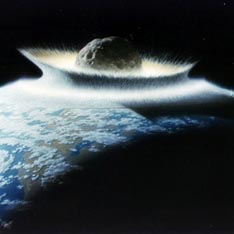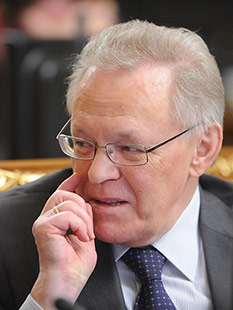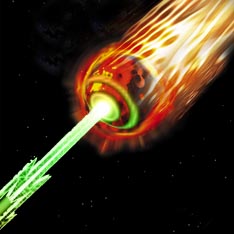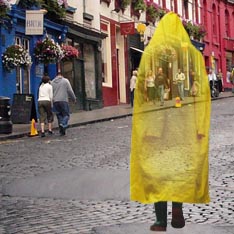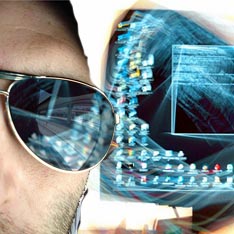Why infertility will stop humans colonising space
By Jerome Taylor
Monday, 14 February 2011
According to a review by three scientists looking into the feasibility of colonising Mars, astronauts would be well advised to avoid getting pregnant along the way because of the high levels of radiation
Renowned astrophysicist Stephen Hawking once remarked that humankind would need to colonise space within the next century if it was to survive as a species.
"It will be difficult enough to avoid disaster in the next 100 years, let alone the next thousand or million," he said somewhat pessimistically last year. "Our only chance of long-term survival is not to remain inward-looking on planet Earth, but to spread out into space."
The prospect of long-term space travel has led scientists to consider, increasingly seriously, the following conundrum: if travelling to a new home might take thousands of years, would humans be able to successfully procreate along the way? The early indications from Nasa are not encouraging. Space, it seems, is simply not a good place to have sex.
According to a review by three scientists looking into the feasibility of colonising Mars, astronauts would be well advised to avoid getting pregnant along the way because of the high levels of radiation that would bombard their bodies as they travelled through space.
Without effective shielding on spaceships, high-energy proton particles would probably sterilise any female foetus conceived in deep space and could have a profound effect on male fertility. "The present shielding capabilities would probably preclude having a pregnancy transited to Mars," said radiation biophysicist Tore Straume of Nasa's Ames Research Center in an essay for the Journal of Cosmology.
The DNA which guides the development of all the cells in the body is easily damaged by the kind of radiation that would assail astronauts as they journeyed through space. Studies on non-human primates have shown that exposure to ionising radiation kills egg cells in a female foetus during the second half of pregnancy. "One would have to be very protective of those cells during gestation, during pregnancy, to make sure that the female didn't become sterile so they could continue the colony," Dr Straume said.
Radiation in space comes from numerous sources but the two types that have Nasa scientists most concerned are solar flares and galactic cosmic rays. Flares are the result of huge explosions in the Sun's atmosphere that catapult highly charged protons across space. The Earth's atmosphere and magnetic field absorbs much of this harmful radiation – but in space astronauts are much more vulnerable.
Galactic cosmic rays pose an even greater threat. They are made up of even heavier charged particles. Although Nasa's shields can protect astronauts against most flare radiation, it is unlikely they could do the same against cosmic rays. Until recently, sex had been a taboo subject for Nasa, which has a strict code of conduct stating that "relationships of trust" among astronauts are to be maintained at all times. Only once has a husband and wife been on the same mission – Jan Davis and Mark Lee – and they have remained tight-lipped over whether they joined the 62-mile high club.









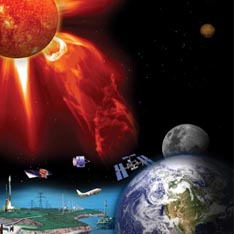












 «Свою
замысловатую теорию
профессор для лучшего
уяснения иллюстрировал
следующим примером, — писал
автор книги «Голографическая
Вселенная» Майкл Талбот. —
Представьте себе
«Свою
замысловатую теорию
профессор для лучшего
уяснения иллюстрировал
следующим примером, — писал
автор книги «Голографическая
Вселенная» Майкл Талбот. —
Представьте себе  А
доказательства
голографичности Вселенной
ученые ожидают, когда
заработает прибор «Голометр»
на полную мощь. Ученые
надеются, что он увеличит
количество практических
данных и знаний этого
необыкновенного открытия,
относящегося пока все же из
области теоретической физики.
Детектор устроен так: светят
лазером через расщепитель
луча, оттуда два луча
проходят через два
перпендикулярных тела,
отражаются, возвращаются
назад, сливаются вместе и
создают интерференционную
картину, где любое искажение
сообщает об изменении
отношения длин тел, так как
гравитационная волна
проходит через тела и сжимает
или растягивает пространство
неодинаково в разных
направлениях.
А
доказательства
голографичности Вселенной
ученые ожидают, когда
заработает прибор «Голометр»
на полную мощь. Ученые
надеются, что он увеличит
количество практических
данных и знаний этого
необыкновенного открытия,
относящегося пока все же из
области теоретической физики.
Детектор устроен так: светят
лазером через расщепитель
луча, оттуда два луча
проходят через два
перпендикулярных тела,
отражаются, возвращаются
назад, сливаются вместе и
создают интерференционную
картину, где любое искажение
сообщает об изменении
отношения длин тел, так как
гравитационная волна
проходит через тела и сжимает
или растягивает пространство
неодинаково в разных
направлениях.









 России необходимо
разработать собственную
программу освоения дальнего
космоса и Луны. Как передает
РИА "Новости", об этом
заявил президент Дмитрий
Медведев на встрече с
молодыми учеными. "Я считаю,
что это очень важная тема,
даже с точки зрения наших
научных амбиций. Если этим не
будем заниматься совсем, мы
деградируем и будем
отброшены на обочину", -
сказал Медведев. Он отметил,
что нельзя за год разработать
программу в этой сфере и
выйти "на равный уровень с
американцами". По словам
Медведева, данной темой
занимаются также специалисты
из Европы и Китая. "Все в
космос прут, надо понять
только, где наше место в
космосе и на Луне", - сказал
президент.
России необходимо
разработать собственную
программу освоения дальнего
космоса и Луны. Как передает
РИА "Новости", об этом
заявил президент Дмитрий
Медведев на встрече с
молодыми учеными. "Я считаю,
что это очень важная тема,
даже с точки зрения наших
научных амбиций. Если этим не
будем заниматься совсем, мы
деградируем и будем
отброшены на обочину", -
сказал Медведев. Он отметил,
что нельзя за год разработать
программу в этой сфере и
выйти "на равный уровень с
американцами". По словам
Медведева, данной темой
занимаются также специалисты
из Европы и Китая. "Все в
космос прут, надо понять
только, где наше место в
космосе и на Луне", - сказал
президент.

